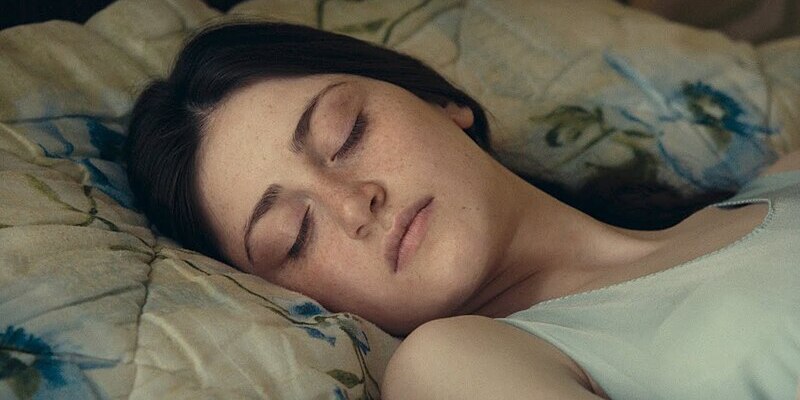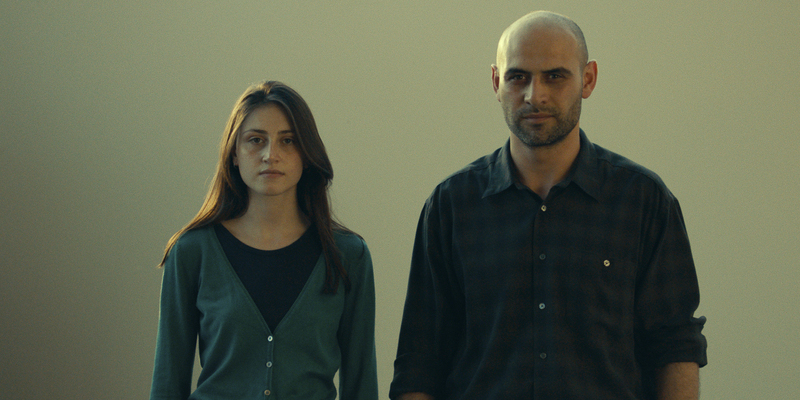
Review by
Benjamin Poole
Directed by: Alexandre Koberidze
Starring: Giorgi Bochorishvili, Ani Karseladze, Oliko Barbakadze, Giorgi Ambroladze, Vakhtang Fanchulidze

Apart from having to listen to other people’s dreams, is there anything
more tedious than a friend telling you about how wonderful their new
relationship is? Banging on that they just know, in their gut, this is the
one; about the coyly amazing sex; the way that their life is now, finally,
on some sort of course towards utopia while you, with your (let’s say
‘fitful’) romantic existence, are expected to nod and smile and say how
happy you are for them? *Shudders* Of course, a couple of months down the
line, when it inevitably goes tits up, that’s the good stuff: in plot
terms, there’s that impelling conflict. Happiness writes white, as they
say. And perhaps this is why, in Aleksandre Koberidze’s cutesy
wutesy rom-dram What Do We See When We Look at the Sky?, when lead characters Lisa (Oliko Barbakadze) and Girogi (Giorgi Ambroladze) fall in love they do so in a manner which is perfunctory in both visual
and narrative terms. In a tight shot we see two pairs of shoes in
parallel, with their owners out of frame, reciting the dialogue of their
meet cute. The characters bump into each other, someone drops a book, the
other picks it up: this happens two and a half times (on the third bump
the book isn’t dropped). Neither of them knows which way they are going,
nor seem to be able to see what is directly in front of them! They are
soooo quirky.

You hate them already. Which is a massive problem, as seeing what stands
for narrative tension in
What Do We See When We Look at the Sky? concerns these pair
of milksops getting it together. After some flimflam about who each is
(it’s not worth me typing it out), the two meet again; this time in an
extreme wide angle which shrinks our heroes to dots who agree to meet in a
café the next day. They fell in love when they bumped into each other
three times earlier, you see. And if you don’t, you’ll have to accept it,
as the next two hours plus of cinema depends on you buying this
relationship.
Perhaps in the constructed anonymity of Lisa and Giorgi, Koberidze is
proffering a wider point about the universality of love and romance.
Giorgi and Lisa could be any of us, the film is maybe suggesting. They’re
not though: they look and behave like people who find ukulele covers of
popular songs endearing. Plus, Koberidze draws on everything but the
performances of the two, and any actual chemistry, to convince us of the
instancy of the coupling. A sweeping 1950s style score, for instance. And
a narrator who tells us how monumental it all is. This reliance on
external factors propagates a vague ‘idea’ of love and does little to
invest us.

On her way home that night, Lisa is spoken to by things like a security
camera, and a shrub. This is not a terrifyingly psychosomatic episode for
the girl, but yet more unconvincing whimsy. The suddenly sentient objects
warn her of a curse which affects lovers (the random nature of this
sequence is not adorably magical, but annoying and lazy: throughout, the
film uses its dainty narrative turns as a pastel camouflage for its fatal
lack of substance). As Lisa falls asleep, an intertitle informs us to also
close our eyes, and then open them upon an audio signal. On principle I
obviously didn’t, which was perspicacious of me as when Lisa and Giorgi
(now played by Ani Karseladze and Giorgi Bochorishvili -
2ManyGiorgis) wake up they look completely different to the people they
fell asleep as! No one recognises them and so how will they ever identify
each other? Maybe love itself will die.
Now one wonders if Koberidze is making some sort of witty comment about
the bland anonymity of his characters, but if he is, then that is some
commitment, and the joke is ultimately on his audience. Because the next
two hours involves the two drawn to the café where they were to have their
fated meeting (and, in fact, both working in the place), but sort of
accidentally avoiding each other due, perhaps, to that bloody curse. This
isn’t really conflict, more a plot imposition. It’s a bit of a thin
premise, which Koberidze nonetheless pads the fuck out with successively
arbitrary non-casual sequences. Why take a minute over a scene when you
could have five? Heck, take six. Again, this approach suffocates the
drama. Towards the end of the film, time is taken over Lisa fixing her
hair but the potential intimacy of this sequence is blanded out by the
ubiquity of similarly extended scenes: low angle shots of tree branches
with native singing on the soundtrack, a montage of kids playing football,
a subplot about dogs meeting on a bridge. #Quaint, yeah?

If the div kid from American Beauty who films that plastic
bag made a feature then perhaps it would be
What Do We See When We Look at the Sky?. Self-absorbed and labouring under the misapprehension that because it
believes something to be profound then it simply must be,
What Do We See When We Look at the Sky? offends with its
superficiality posing as wisdom. With the tasteful mise-en-scene of a John
Lewis advert, and the mediocre heteronormativity of the central conflict
(as in children’s fairy tales, we are meant to care if the man and woman
get together because isn’t that what men and women are meant to do,
whether they want to or not?), this is a film which will appeal to the
sort of simple hearted people who see its capricious sky gazing title as a
query of profound implications.

What Do We See When We Look at the Sky? is on MUBI UK now.
